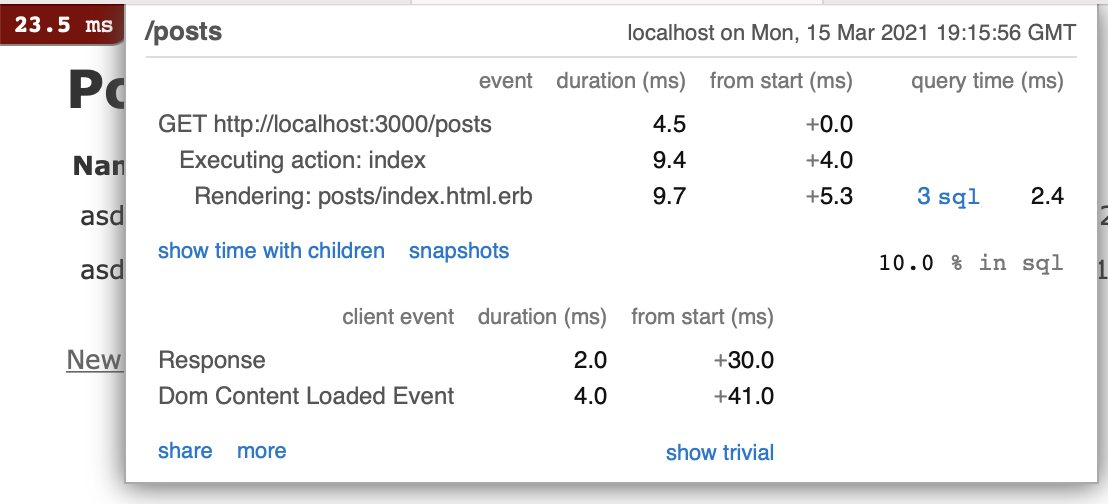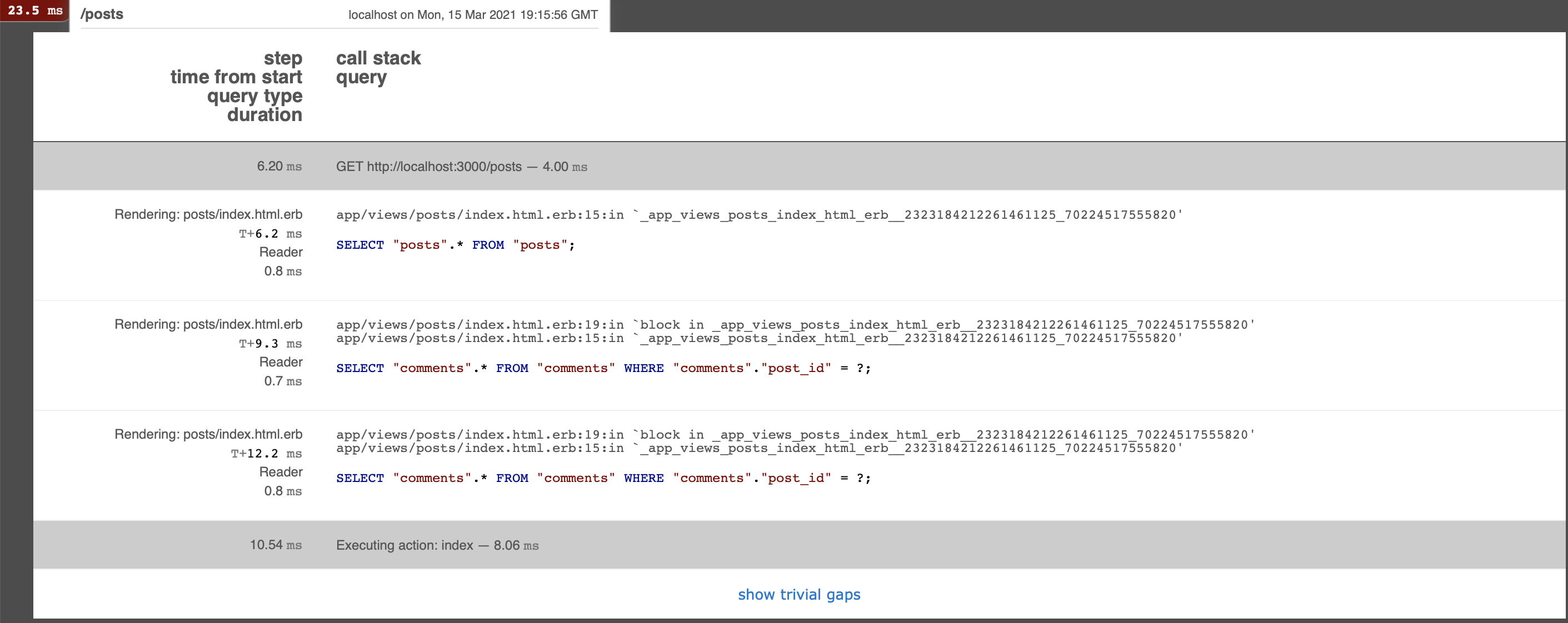Tools to help you detect n+1 queries
March 1, 2021, updated on July 12, 2023There are many tools that can help you detect n+1 queries in different ways.
This is a little reference of some of those tools:
You don’t need to use all of them, but is good to know that they exists and how they can help you.
Rails strict_loading
How it can help you?
You can add #strict_loading! to any record to prevent lazy loading of
associations. Strict loading will cascade down from the parent record to all the
associations to help you catch any places where you may want to use preload
instead of lazy loading.
On a record:
user = User.first
user.strict_loading!
user.comments.to_a
=> ActiveRecord::StrictLoadingViolationError
On a relation:
user = User.strict_loading.first
user.comments.to_a
=> ActiveRecord::StrictLoadingViolationError
On an association definition:
class User < ApplicationRecord
has_many :comments, strict_loading: true
end
class Comment < ApplicationRecord
belongs_to :user
end
user = User.first
user.comments.to_a
=> ActiveRecord::StrictLoadingViolationError
Per model configuration:
class User < ApplicationRecord
self.strict_loading_by_default = true
has_many :comments
end
class Comment < ApplicationRecord
belongs_to :user
end
user = User.first
user.comments.to_a
=> ActiveRecord::StrictLoadingViolationError
If you want to enable strict loading by default you can do it with:
config.active_record.strict_loading_by_default = true
If you can change the action on strict loading violation from :raise (default) to :log you can do it with:
config.active_record.action_on_strict_loading_violation = :log
References
- ActiveRecord::Core
- ActiveRecord::QueryMethods
- Pull request: Add
strict_loadingmode to optionally prevent lazy loading
Rack mini profiler
How it can help you?
It can help you with more than just detecting n+1 queries. It is a production and development profiler, it allows you to quickly isolate performance bottlenecks, both on the server and client.
It can help you with:
- Database profiling
- Call-stack profiling
- Memory profiling
How does the report looks like?
It displays a speed badge for every html page that if you click it, it will show you a page with the profiling information of the current page.

And if you click on of the sql queries count, it will show you a list with all the queries…

Although it will not tell you exactly that you have an n+1 quieries problem, it can help you a lot to visualize it.
References
Bullet
How can it help you?
It will watch your queries while you develop your application and notify you when it detects one of this problems:
- n+1 queries
- eager-loaded associations which are not used
- unnecessary COUNT queries which could be avoided with a counter cache
You can use it on the development and testing environments.
Sometimes Bullet may notify you of query problems you don’t care to fix, or which come from outside your code. You can whitelist these to ignore them.
How does the error report looks like?
For n+1 queries…
GET /posts
USE eager loading detected
Post => [:comments]
Add to your query: .includes([:comments])
Call stack
/Users/benitoserna/code/bullet-test/app/views/posts/index.html.erb:20:in `map'
/Users/benitoserna/code/bullet-test/app/views/posts/index.html.erb:20:in `block in _app_views_posts_index_html_erb__1178069968615334744_70147771830640'
/Users/benitoserna/code/bullet-test/app/views/posts/index.html.erb:16:in `_app_views_posts_index_html_erb__1178069968615334744_70147771830640'
For unused eager loading…
GET /posts
AVOID eager loading detected
Post => [:comments]
Remove from your query: .includes([:comments])
Call stack
References
Prosopite
How can it help you?
Prosopite is able to auto-detect Rails N+1 queries, but it also can help you detect some cases where bullet will give you false positives or false negatives.
Prosopite monitors all SQL queries using the Active Support instrumentation and looks for a pattern which is present in all N+1 query cases: More than one queries have the same call stack and the same query fingerprint.
You can use it on the development and testing environments.
Compared to bullet, Prosopite can auto-detect the following extra cases of N+1 queries:
- N+1 queries after record creations (usually in tests)
FactoryBot.create_list(:leg, 10)
Leg.last(10).each do |l|
l.chair
end
- Not triggered by ActiveRecord associations
Leg.last(4).each do |l|
Chair.find(l.chair_id)
end
- First/last/pluck of collection associations
Chair.last(20).each do |c|
c.legs.first
c.legs.last
c.legs.pluck(:id)
end
- Changing the ActiveRecord class with #becomes
Chair.last(20).map{ |c| c.becomes(ArmChair) }.each do |ac|
ac.legs.map(&:id)
end
- Mongoid models calling ActiveRecord
class Leg::Design
include Mongoid::Document
...
field :cid, as: :chair_id, type: Integer
...
def chair
@chair ||= Chair.where(id: chair_id).first!
end
end
Leg::Design.last(20) do |l|
l.chair
end
How does the error report looks like?
The report will show you the N+1 queries detected and the call stack.
N+1 queries detected:
SELECT `users`.* FROM `users` WHERE `users`.`id` = 20 LIMIT 1
SELECT `users`.* FROM `users` WHERE `users`.`id` = 21 LIMIT 1
SELECT `users`.* FROM `users` WHERE `users`.`id` = 22 LIMIT 1
SELECT `users`.* FROM `users` WHERE `users`.`id` = 23 LIMIT 1
SELECT `users`.* FROM `users` WHERE `users`.`id` = 24 LIMIT 1
Call stack:
app/controllers/thank_you_controller.rb:4:in `block in index'
app/controllers/thank_you_controller.rb:3:in `each'
app/controllers/thank_you_controller.rb:3:in `index':
app/controllers/application_controller.rb:8:in `block in <class:ApplicationController>'
References
NPlusOneControl
How can it help you?
It gives you rspec and minitest matchers to prevent the n+1 queries problem.
It evaluates the code under consideration several times with different scale factors to make sure that the number of DB queries behaves as expected (i.e. O(1) instead of O(N)).
So, it’s for performance testing and not feature testing.
How does the error report looks like?
In the default mode it can give you something like this.
Expected to make the same number of queries, but got:
10 for N=2
11 for N=3
Unmatched query numbers by tables:
resources (SELECT): 2 != 3
permissions (SELECT): 4 != 6
And in the “verbose” mode, it can give you something like this…
Expected to make the same number of queries, but got:
2 for N=2
3 for N=3
Unmatched query numbers by tables:
resources (SELECT): 2 != 3
Queries for N=2
SELECT "resources".* FROM "resources" WHERE "resources"."deleted_at" IS NULL
↳ app/controllers/resources_controller.rb:32:in `index'
...
Queries for N=3
...
References
- github/palkan/n plus one control
- Squash N+1 queries early with n plus one control test matchers for Ruby and Rails
Related articles
Download a free ebook to learn the basics of n+1 queries on Rails basics
Learn just enough fundamentals to be fluent preloading associations with ActiveRecord, and start helping your team to avoid n+1 queries on production.